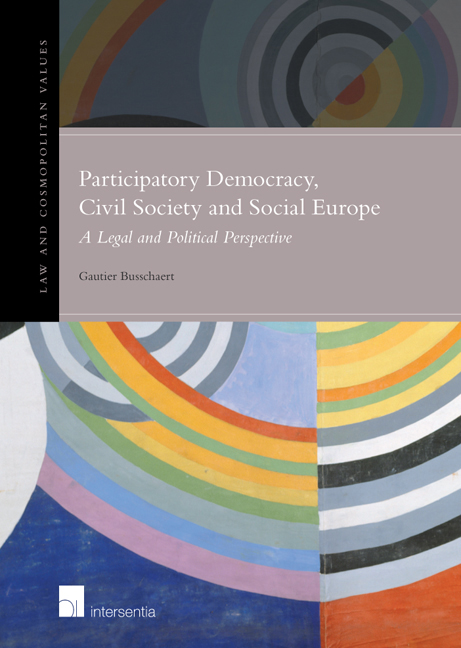Book contents
- Frontmatter
- Acknowledgements
- Contents
- Abbreviations
- Chapter 1 Democratic EU: from Representation to Participation
- Chapter 2 Reviewing the Participatory Ideal of Bits and Pieces
- Chapter 3 Overcoming the Participatory Ideal of Bits and Pieces
- Chapter 4 Revisiting the Fundamentals of Internal Market Law
- Chapter 5 Revisiting the Fundamentals of European Competition Law
- Chapter 6 The Civil Dialogue – A Magic Cure for the Democratic Ailments of the Community Method?
- Chapter 7 The Open Method of Coordination – Radicalising Participatory Democracy in the EU?
- Chapter 8 Looking Back – Moving Forward
- Table of Legislation
- Table of Cases
- Bibliography
Chapter 2 - Reviewing the Participatory Ideal of Bits and Pieces
Published online by Cambridge University Press: 22 September 2018
- Frontmatter
- Acknowledgements
- Contents
- Abbreviations
- Chapter 1 Democratic EU: from Representation to Participation
- Chapter 2 Reviewing the Participatory Ideal of Bits and Pieces
- Chapter 3 Overcoming the Participatory Ideal of Bits and Pieces
- Chapter 4 Revisiting the Fundamentals of Internal Market Law
- Chapter 5 Revisiting the Fundamentals of European Competition Law
- Chapter 6 The Civil Dialogue – A Magic Cure for the Democratic Ailments of the Community Method?
- Chapter 7 The Open Method of Coordination – Radicalising Participatory Democracy in the EU?
- Chapter 8 Looking Back – Moving Forward
- Table of Legislation
- Table of Cases
- Bibliography
Summary
INTRODUCTION
Whereas the participatory theory of democracy, and the arguments contemporary theorists have made against it, sheds light on the EU's timid turn to citizen-based participatory democracy, it leaves us empty-handed when it comes to assessing the embrace of civil-society-centric participatory democracy (2.2). The latter understanding of participatory democracy has brought up many questions with which European integration literature is still struggling. Scholars are battling for the soul of (European) civil society. How can one define civil society, what are its conceptual boundaries and the function it performs in modern societies, particularly in the EU (2.3)? They also see civil society, however defined, through the lenses of different democratic theories which, they claim, are modern variants of the old participatory ideal. Different views on the nature of the EU-polity bring up a further layer of complexity to the debate on the merits and demerits of the participatory turn. Is the EU a state in the making, a political system or a system of participatory governance (2.4)? This chapter will take a stand on these issues so that the reader understands where this book positions itself in the theoretical debate on the participatory turn. This chapter will also identify a major shortcoming in the literature which the theoretical framework exposed in Chapter 3 aims to overcome: by systematically neglecting the maximum participation of citizens in political life as well as the inequality bias of market capitalism, existing scholarship only incorporates bits and pieces of the ideal of participatory democracy (2.5).
THE PARTICIPATORY THEORY OF DEMOCRACY AND ITS LIMITS
The participatory theory of democracy seems like the most convenient starting point for finding normative benchmarks against which to assess the participatory turn. There is not one single participatory theory of democracy, but rather an elusive list of authors who have expressed a common weariness towards the contemporary theory of democracy for its neglect of participation. Indeed, the contemporary theory of democracy, contrary to the classical democratic theory and its modern participatory proponents, advocates minimal participation: too much participation would threaten the stability of the system, while no participation would quickly turn into tyranny. The main features of the participatory theory of democracy as well as the arguments contemporary theorists hold against it will be presented in this section with a view to assess the participatory turn.
- Type
- Chapter
- Information
- Participatory Democracy, Civil Society and Social EuropeA Legal and Political Perspective, pp. 17 - 34Publisher: IntersentiaPrint publication year: 2016



